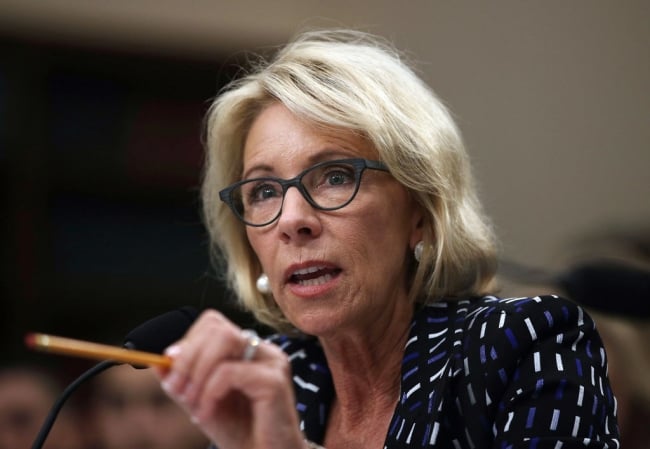You have /5 articles left.
Sign up for a free account or log in.

U.S. Education Secretary Betsy DeVos
Getty Images/Alex Wong
The U.S. Department of Education on Wednesday released its long-awaited final regulations governing campus sexual assault under Title IX, the law prohibiting sex discrimination at federally funded institutions.
It took nearly a year and a half for the department’s Office for Civil Rights, or OCR, to review more than 124,000 public comments on the issue and finalize the proposed regulations, which were published in November 2018. The regulations will be the first Title IX guidance published by OCR to go through a formal notice-and-comment process since 1997, and unlike guidance issued by the Obama administration in 2011 and 2014, they will have the force of law behind them. Colleges and universities will be required to comply with the regulations by Aug. 14.
Betsy DeVos, the secretary of education, said the new regulation will secure due process rights for students who report sexual misconduct and for those accused of it, by requiring colleges to provide live hearings and allowing students' advisers to cross-examine parties and witnesses involved. Under the new rules, institutions must presume that those accused of sexual misconduct are innocent prior to the investigative and decision-making process, addressing a repeated criticism of 2011 guidance issued by the Obama administration. Those in favor of a Title IX overhaul say the Obama guidance, referred to as the Dear Colleague letter, caused colleges to overenforce campus sexual misconduct and led to students being unjustly removed from campuses for false accusations. DeVos rescinded the letter in 2017.
The Obama guidance stated college officials should use a “preponderance of the evidence” standard to determine guilt in sexual misconduct complaints, basing decisions on the most convincing evidence presented. It was followed by an explosion of civil lawsuits filed mostly by male students accused of sexual misconduct, who alleged their rights were violated by unfair Title IX procedures at their colleges. The 2020 regulations will instead allow Title IX officials at colleges to use either a preponderance of the evidence or “clear and convincing” standard, which sets a higher burden of proof.
The new evidence and cross-examination standards have been points of contention for advocates for survivors of campus sexual assault, who say live questioning could retraumatize and prevent victims from coming forward to report sexual misconduct. Statements made by parties and not cross-examined as part of a Title IX investigation may not be used as evidence, a summary of the new regulations said.
The regulations also explicitly define the scope of colleges’ responsibility to respond to complaints of sexual misconduct. Colleges must act upon complaints of misconduct that occurs within an education program, such as in off-campus housing for recognized Greek life organizations or at events that are part of a university program. But a college “may address sexual harassment affecting its students or employees that falls outside Title IX’s jurisdiction in any manner the school chooses,” the regulations say.
What experts say are the most significant aspects of the new rule.
- Colleges and universities will now be required to allow cross-examination of the complaining and responding parties, as well as any witnesses, during a live hearing led by institution officials. Cross-examination will be conducted by advisers for parties, including legal counsel, but not the parties themselves.
- Colleges are only obligated to respond to reports of sexual harassment that occurred off-campus if the location is in use by an officially recognized student or institution organization, such as recognized fraternity or sorority housing or athletic housing.
- Colleges will be able to determine whether to use a “preponderance of the evidence” or “clear and convincing” standard as a burden of proof and must use the same standard for all complaints, no matter if they involve student or faculty misconduct.
- Stalking, domestic violence and dating violence are now officially considered examples of sexual harassment under Title IX.
- The definition of sexual harassment is more narrow than previous guidance. It is defined as “any unwelcome conduct that a reasonable person would find so severe, pervasive and objectively offensive that it denies a person equal educational access.” Reports of sexual assault, dating violence, domestic violence and stalking do not need to meet the description of “severe, pervasive and objectively offensive.”
- Colleges are not obligated to handle complaints of sexual harassment that occurs outside the United States. This means any harassment or assault that happens in American education programs abroad would not be covered by Title IX, but the new regulations say institutions “remain free” to apply misconduct policies for programs abroad if they so choose.
- If a Title IX coordinator receives multiple informal complaints of harassment against a single respondent, they will not be required to begin a formal complaint process. The department changed this requirement from the proposed rule, which sought to obligate Title IX coordinators to take action after receiving multiple informal reports against the same person.
- Colleges can no longer use a “single investigator model,” which has one official tasked with investigating, adjudicating and issuing disciplinary sanctions against respondents. The regulations instead require three separate officials to work through separate pieces of a single Title IX complaint process: a Title IX coordinator, who receives reports of sexual misconduct; an investigator, to gather facts and interview parties and witnesses; and a decision maker, to determine sanctions and remedies for parties.
- Colleges must train all personnel involved in the Title IX process and publish training materials on their websites. Training must involve review of the new rule’s definition of sexual harassment and the scope of the application of Title IX to college programs and activities, how to conduct a formal or informal process, and how to “serve impartially,” including avoidance of “prejudgment of the facts at issue, conflicts of interest, and bias.”
- Title IX processes may be conducted virtually, and staff must be trained on relevant technology to conduct remote investigations and hearings. Live hearings will be recorded, by transcript or audiovisually, and will be made available to parties and maintained in college records for at least seven years.
- Colleges must provide evidence related to allegations to parties and advisers at least 10 days prior to requiring a response, and parties will not be prohibited from speaking about the allegations. This means doing away with “gag orders.”
- Colleges are not obligated to follow a specific time frame for responding to reports of sexual misconduct. They are instead required to have “reasonably prompt” periods for carrying out each step in the Title IX complaint process.
Favorable to All Students?
The rule “balances the scales of justice” on U.S. campuses and fulfills promises by the Trump administration to address college sexual misconduct, DeVos said on Twitter. A statement from the White House said the new regulations ensure “even-handed justice” and address the “bureaucracy” of American colleges and universities that have “often stacked the deck against the accused.” The regulations also strengthen Title IX in the interest of survivors, the statement said.
The rule is focused on protecting students on both sides of Title IX complaints, Kenneth Marcus, assistant secretary of OCR, said in a statement from the department.
“It marks the end of the false dichotomy of either protecting survivors, while ignoring due process, or protecting the accused, while disregarding sexual misconduct,” Marcus said. “There is no reason why educators cannot protect all of their students -- and under this regulation there will be no excuses for failing to do so.”
The comments from federal officials attempt to provide assurances that the new rule protects all students -- including survivors of sexual misconduct -- but the various groups that represent the interests of and that include survivors themselves vehemently disagree.
The new regulations wouldn’t have been welcomed by Know Your IX, a national advocacy group for survivors of sexual assault and misconduct, at any time, but the announcement of the changes is "particularly egregious now" as students are navigating the ongoing health crisis and disruption to their college experience caused by the coronavirus pandemic, a statement from the organization said. Sage Carson, manager of Know Your IX, said the final rule ignores the thousands of comments submitted by survivors urging DeVos to rescind it.
“Today, Betsy DeVos and the Trump administration have shown, once again, that they have no interest in supporting student survivors and their rights,” Carson said in a statement. “The final rule makes it harder for survivors to report sexual violence, reduces schools’ liability for ignoring or covering up sexual harassment, and creates a biased reporting process that favors respondents and schools over survivors’ access to education. All this as students struggle to find housing, keep up with online classes, and pay rent as the unemployment rate soars.”
Major implications for survivors in the final rule are the exclusion of trauma-informed investigation procedures that take into account the psychological impact sexual misconduct can have on survivors’ memory and interpretation of events, said Sarah Nesbitt, policy and advocacy organizer for Know Your IX. The cross-examination and live hearing process could also make survivors subject to “being interrogated” by anyone the opposing party chooses to represent them, including a friend, parent or “vicious” attorney, Nesbitt said.
“There’s this misconception that trauma-informed means unfair, when trauma-informed processes are critical to fairness,” Nesbitt said. “None of the new procedures are trauma-informed in any way.”
The prospect of cross-examination may make it harder for students to report sexual misconduct, but it is necessary for testing the credibility of all parties involved, said Andrew Miltenberg, a New York-based attorney known for defending hundreds of students accused of sexual misconduct. He called the process a “necessary evil.”
Janet Napolitano, president of the University of California system, said in a statement that while the rule brings some positive changes, such as the inclusion of relationship violence in the definition of enforceable harassment, Title IX professionals and institutional leaders directly advised against cross-examination. She said the narrower definition that the Education Department applies to harassment “appears to weaken fair and just policies that have taken decades to establish.”
“UC opposes these ill-conceived changes and, in spite of them, will continue our hard-won momentum through education, prevention and processes that are fair and compassionate to all parties,” Napolitano said. “We remain steadfast in our commitment to our students and community and will respond to the rules with care and thoughtfulness. We have come too far as a nation to halt our progress against sexual harassment.”
Know Your IX is preparing to challenge the legality of the final rule in court and hopes to file a complaint this week, Nesbitt said. The department can expect to see a wave of similar legal challenges from colleges as well, leading to a “significant chance” that the regulations may take longer than the Aug. 14 deadline to go into effect, if at all, said Peter Lake, director of the Stetson University Center for Excellence in Higher Education Law and Policy. He said it’s also unlikely colleges will even have the capacity to implement new policies within the given time frame, and some might wait for the outcomes of legal challenges to the rule changes.
“For the first time in history, the Department of Education is creating a college court. You can see how complex of a maneuver that is,” Lake said. “There’s an attempt to make this simple and straightforward, but it’s nothing like that.”
Reaction to the Rule
The Education Department was met with a wave of criticism as soon as the regulations, which were as equally anticipated as the final rule, were published. Several higher education associations and members of Congress urged the department for weeks to hold off on the release to allow colleges to focus on the impact of the coronavirus pandemic.
The American Council on Education, the umbrella membership group for 1,700 college and university leaders, said in a statement that the Education Department “is not living in the real world” by issuing the rule now.
“As a result of the pandemic, virtually every college and university in the country is closed. Choosing this moment to impose the most complex and challenging regulations the agency has ever issued reflects appallingly poor judgment,” Ted Mitchell, ACE's president, said in the statement. “We pleaded with the department to hold off issuing these regulations at a time when campuses across America are shuttered until further notice. Faculty, staff and students are doing their best to adjust teaching, learning, and research to a new world without any personal interaction. It is a time of high stress, heroic efforts and extraordinary adaptation.”
Mitchell also criticized an "incomprehensible mandate" for colleges and universities to fully implement the new regulations by Aug. 14, a decision he called as "cruel as it is counter-productive."
Lake said it's “unthinkable” for the department to require additional staffing in colleges' Title IX offices by the beginning of the 2020-21 academic year, at a time when many institutions are facing significant budget shortfalls. The final rule requires at least three separate officials to carry out different steps of the Title IX complaint process.
“A lot of people are going to be out of compliance for an entire academic year,” Lake said. “The timing of this is really difficult for higher ed: late in the budget cycle, during a crisis and when they don’t have money.”
The department typically gives institutions at least eight months to implement new rules, more than twice the time they are currently being allowed, Mitchell said.
"This is irrational, unrealistic and completely at odds with the Trump administration’s oft-repeated statement to tread lightly when imposing complex new regulations," Mitchell said.
Senator Lamar Alexander, the Tennessee Republican who leads the Senate's education committee, applauded the department's action.
“This final rule respects and supports victims and preserves due process rights for both the victim and the accused,” Alexander said in a written statement. “For example, the rule ensures victims get the support they need to change classes or dorms if they allege they have been sexually assaulted or sexually harassed and the rule ensures the victim and the accused get a fair hearing to resolve such allegations. I am glad Secretary DeVos undertook this rulemaking to help give more certainty to victims, the accused and college administrators.”
The Foundation for Individual Rights in Education, or FIRE, said in a press release that the final rule ensures long-awaited due process protections that have been denied to students accused of misconduct for more than a decade. Robert Shibley, executive director of FIRE, called the regulations “an important victory.”
“FIRE led the charge to introduce fairness to campus proceedings, first nearly alone, then with a growing number of allies,” Shibley said. “But our work is not over. We will continue to fight to ensure that students are afforded the rights now guaranteed to them when they return to campus this fall.”
Senator Patty Murray, a Democrat from Washington State and Alexander's colleague on the education committee, said the final rule weakens the support institutions are required to provide survivors of sexual harassment and assault and discourages reporting of misconduct. Murray also criticized the timing of the department's announcement and said it instead should be "using every resource available" to help institutions manage the impact of the coronavirus pandemic.
"Let me be clear: this rule is not about ‘restoring balance,’ this is about silencing survivors," Murray said in a statement. "This rule will make it that much harder for a student to report an incident of sexual assault or harassment -- and that much easier for a school to sweep it under the rug. There is an epidemic of sexual assault in schools -- that’s not up for debate. But instead of responsibly working with advocates, survivors, students, K-12 schools, and colleges to address the issue, Secretary DeVos and this Administration are going out of their way to make schools less safe."
-- Paul Fain contributed to this article.




